Rumi's Poem: A Close Reading and Language Analysis Essay
VerifiedAdded on 2023/04/05
|7
|1896
|267
Essay
AI Summary
This essay offers a close reading and language analysis of the first seven lines of Jalāl ad-Dīn Muhammad Rūmī’s poem “In the Garden of the Mystic Lovers.” The analysis focuses on Rumi's use of simple language to convey profound spiritual and philosophical ideas about union with the Almighty. It examines the poem's vocabulary, rhetoric, and tone, highlighting the poet's wordplay and the subtle nuances in his choice of words. The essay explores how Rumi uses pronouns, articles, and sentence structure to create ambiguity and invite readers to engage with the poem on multiple levels. It also discusses the historical and spiritual connotations of Rumi's name and the potential interpretations of the poem's themes of love, loss, and the search for divine connection. The analysis concludes by reflecting on the poem's enduring power and its ability to resonate with readers across cultures and time.
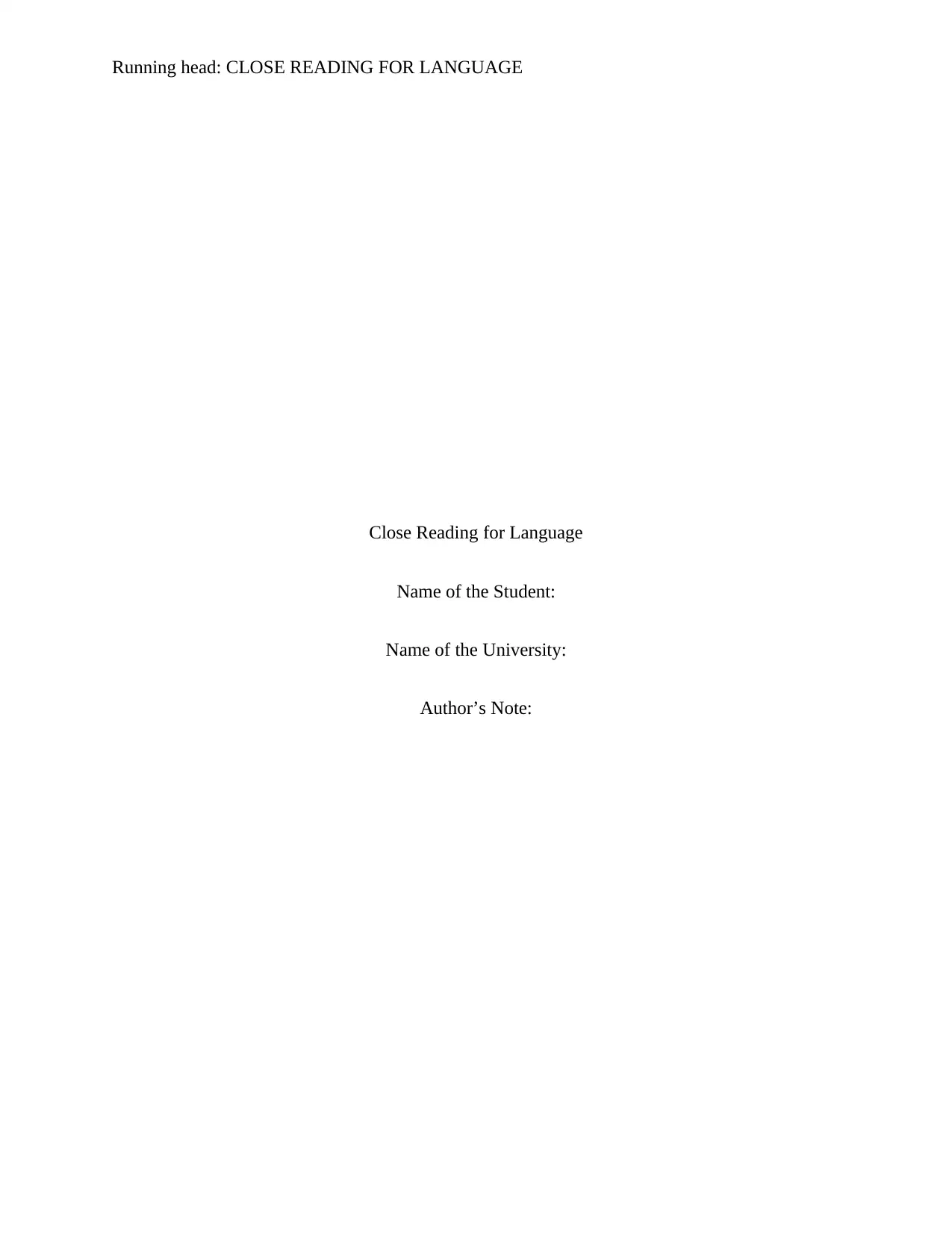
Running head: CLOSE READING FOR LANGUAGE
Close Reading for Language
Name of the Student:
Name of the University:
Author’s Note:
Close Reading for Language
Name of the Student:
Name of the University:
Author’s Note:
Paraphrase This Document
Need a fresh take? Get an instant paraphrase of this document with our AI Paraphraser
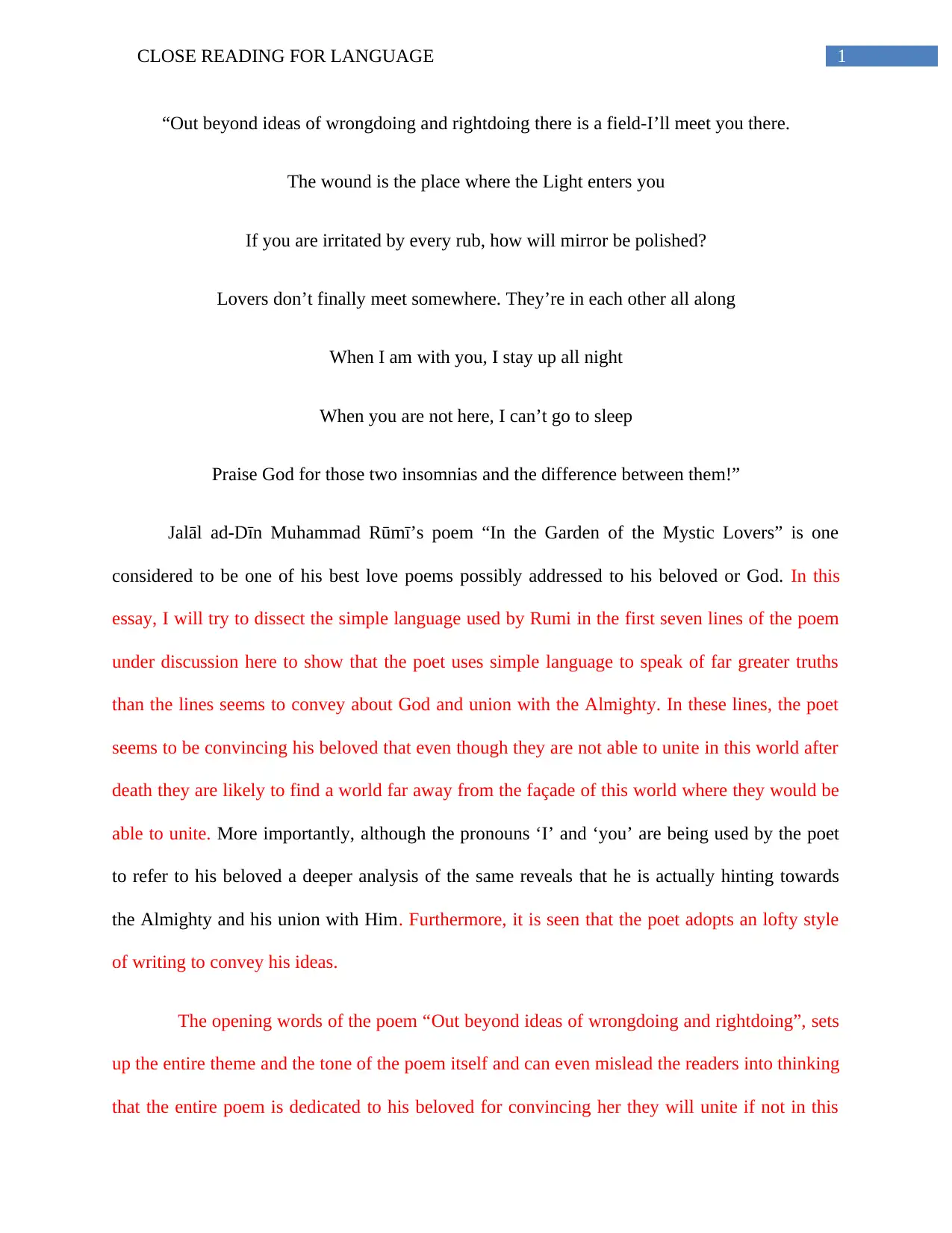
1CLOSE READING FOR LANGUAGE
“Out beyond ideas of wrongdoing and rightdoing there is a field-I’ll meet you there.
The wound is the place where the Light enters you
If you are irritated by every rub, how will mirror be polished?
Lovers don’t finally meet somewhere. They’re in each other all along
When I am with you, I stay up all night
When you are not here, I can’t go to sleep
Praise God for those two insomnias and the difference between them!”
Jalāl ad-Dīn Muhammad Rūmī’s poem “In the Garden of the Mystic Lovers” is one
considered to be one of his best love poems possibly addressed to his beloved or God. In this
essay, I will try to dissect the simple language used by Rumi in the first seven lines of the poem
under discussion here to show that the poet uses simple language to speak of far greater truths
than the lines seems to convey about God and union with the Almighty. In these lines, the poet
seems to be convincing his beloved that even though they are not able to unite in this world after
death they are likely to find a world far away from the façade of this world where they would be
able to unite. More importantly, although the pronouns ‘I’ and ‘you’ are being used by the poet
to refer to his beloved a deeper analysis of the same reveals that he is actually hinting towards
the Almighty and his union with Him. Furthermore, it is seen that the poet adopts an lofty style
of writing to convey his ideas.
The opening words of the poem “Out beyond ideas of wrongdoing and rightdoing”, sets
up the entire theme and the tone of the poem itself and can even mislead the readers into thinking
that the entire poem is dedicated to his beloved for convincing her they will unite if not in this
“Out beyond ideas of wrongdoing and rightdoing there is a field-I’ll meet you there.
The wound is the place where the Light enters you
If you are irritated by every rub, how will mirror be polished?
Lovers don’t finally meet somewhere. They’re in each other all along
When I am with you, I stay up all night
When you are not here, I can’t go to sleep
Praise God for those two insomnias and the difference between them!”
Jalāl ad-Dīn Muhammad Rūmī’s poem “In the Garden of the Mystic Lovers” is one
considered to be one of his best love poems possibly addressed to his beloved or God. In this
essay, I will try to dissect the simple language used by Rumi in the first seven lines of the poem
under discussion here to show that the poet uses simple language to speak of far greater truths
than the lines seems to convey about God and union with the Almighty. In these lines, the poet
seems to be convincing his beloved that even though they are not able to unite in this world after
death they are likely to find a world far away from the façade of this world where they would be
able to unite. More importantly, although the pronouns ‘I’ and ‘you’ are being used by the poet
to refer to his beloved a deeper analysis of the same reveals that he is actually hinting towards
the Almighty and his union with Him. Furthermore, it is seen that the poet adopts an lofty style
of writing to convey his ideas.
The opening words of the poem “Out beyond ideas of wrongdoing and rightdoing”, sets
up the entire theme and the tone of the poem itself and can even mislead the readers into thinking
that the entire poem is dedicated to his beloved for convincing her they will unite if not in this
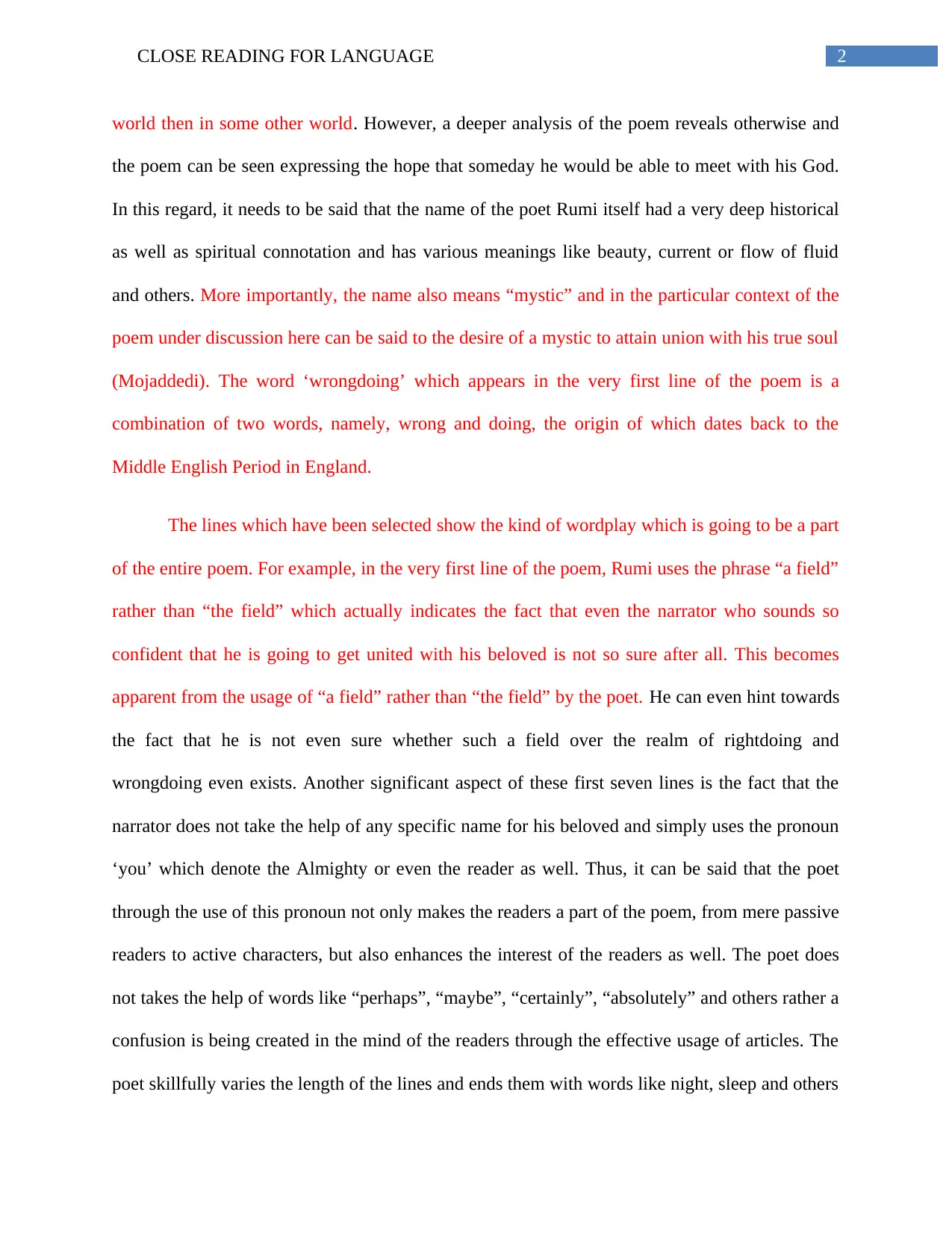
2CLOSE READING FOR LANGUAGE
world then in some other world. However, a deeper analysis of the poem reveals otherwise and
the poem can be seen expressing the hope that someday he would be able to meet with his God.
In this regard, it needs to be said that the name of the poet Rumi itself had a very deep historical
as well as spiritual connotation and has various meanings like beauty, current or flow of fluid
and others. More importantly, the name also means “mystic” and in the particular context of the
poem under discussion here can be said to the desire of a mystic to attain union with his true soul
(Mojaddedi). The word ‘wrongdoing’ which appears in the very first line of the poem is a
combination of two words, namely, wrong and doing, the origin of which dates back to the
Middle English Period in England.
The lines which have been selected show the kind of wordplay which is going to be a part
of the entire poem. For example, in the very first line of the poem, Rumi uses the phrase “a field”
rather than “the field” which actually indicates the fact that even the narrator who sounds so
confident that he is going to get united with his beloved is not so sure after all. This becomes
apparent from the usage of “a field” rather than “the field” by the poet. He can even hint towards
the fact that he is not even sure whether such a field over the realm of rightdoing and
wrongdoing even exists. Another significant aspect of these first seven lines is the fact that the
narrator does not take the help of any specific name for his beloved and simply uses the pronoun
‘you’ which denote the Almighty or even the reader as well. Thus, it can be said that the poet
through the use of this pronoun not only makes the readers a part of the poem, from mere passive
readers to active characters, but also enhances the interest of the readers as well. The poet does
not takes the help of words like “perhaps”, “maybe”, “certainly”, “absolutely” and others rather a
confusion is being created in the mind of the readers through the effective usage of articles. The
poet skillfully varies the length of the lines and ends them with words like night, sleep and others
world then in some other world. However, a deeper analysis of the poem reveals otherwise and
the poem can be seen expressing the hope that someday he would be able to meet with his God.
In this regard, it needs to be said that the name of the poet Rumi itself had a very deep historical
as well as spiritual connotation and has various meanings like beauty, current or flow of fluid
and others. More importantly, the name also means “mystic” and in the particular context of the
poem under discussion here can be said to the desire of a mystic to attain union with his true soul
(Mojaddedi). The word ‘wrongdoing’ which appears in the very first line of the poem is a
combination of two words, namely, wrong and doing, the origin of which dates back to the
Middle English Period in England.
The lines which have been selected show the kind of wordplay which is going to be a part
of the entire poem. For example, in the very first line of the poem, Rumi uses the phrase “a field”
rather than “the field” which actually indicates the fact that even the narrator who sounds so
confident that he is going to get united with his beloved is not so sure after all. This becomes
apparent from the usage of “a field” rather than “the field” by the poet. He can even hint towards
the fact that he is not even sure whether such a field over the realm of rightdoing and
wrongdoing even exists. Another significant aspect of these first seven lines is the fact that the
narrator does not take the help of any specific name for his beloved and simply uses the pronoun
‘you’ which denote the Almighty or even the reader as well. Thus, it can be said that the poet
through the use of this pronoun not only makes the readers a part of the poem, from mere passive
readers to active characters, but also enhances the interest of the readers as well. The poet does
not takes the help of words like “perhaps”, “maybe”, “certainly”, “absolutely” and others rather a
confusion is being created in the mind of the readers through the effective usage of articles. The
poet skillfully varies the length of the lines and ends them with words like night, sleep and others
⊘ This is a preview!⊘
Do you want full access?
Subscribe today to unlock all pages.

Trusted by 1+ million students worldwide
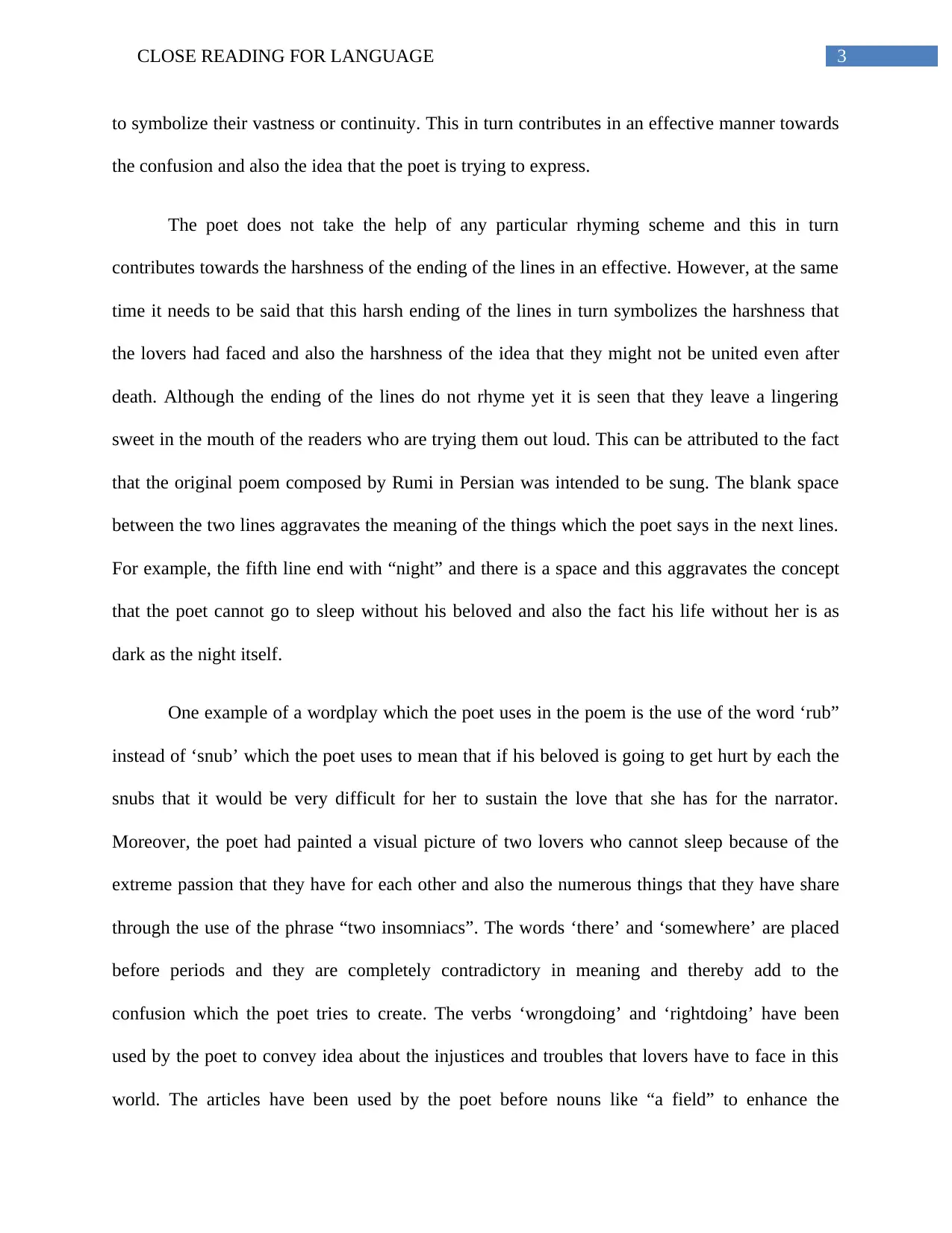
3CLOSE READING FOR LANGUAGE
to symbolize their vastness or continuity. This in turn contributes in an effective manner towards
the confusion and also the idea that the poet is trying to express.
The poet does not take the help of any particular rhyming scheme and this in turn
contributes towards the harshness of the ending of the lines in an effective. However, at the same
time it needs to be said that this harsh ending of the lines in turn symbolizes the harshness that
the lovers had faced and also the harshness of the idea that they might not be united even after
death. Although the ending of the lines do not rhyme yet it is seen that they leave a lingering
sweet in the mouth of the readers who are trying them out loud. This can be attributed to the fact
that the original poem composed by Rumi in Persian was intended to be sung. The blank space
between the two lines aggravates the meaning of the things which the poet says in the next lines.
For example, the fifth line end with “night” and there is a space and this aggravates the concept
that the poet cannot go to sleep without his beloved and also the fact his life without her is as
dark as the night itself.
One example of a wordplay which the poet uses in the poem is the use of the word ‘rub”
instead of ‘snub’ which the poet uses to mean that if his beloved is going to get hurt by each the
snubs that it would be very difficult for her to sustain the love that she has for the narrator.
Moreover, the poet had painted a visual picture of two lovers who cannot sleep because of the
extreme passion that they have for each other and also the numerous things that they have share
through the use of the phrase “two insomniacs”. The words ‘there’ and ‘somewhere’ are placed
before periods and they are completely contradictory in meaning and thereby add to the
confusion which the poet tries to create. The verbs ‘wrongdoing’ and ‘rightdoing’ have been
used by the poet to convey idea about the injustices and troubles that lovers have to face in this
world. The articles have been used by the poet before nouns like “a field” to enhance the
to symbolize their vastness or continuity. This in turn contributes in an effective manner towards
the confusion and also the idea that the poet is trying to express.
The poet does not take the help of any particular rhyming scheme and this in turn
contributes towards the harshness of the ending of the lines in an effective. However, at the same
time it needs to be said that this harsh ending of the lines in turn symbolizes the harshness that
the lovers had faced and also the harshness of the idea that they might not be united even after
death. Although the ending of the lines do not rhyme yet it is seen that they leave a lingering
sweet in the mouth of the readers who are trying them out loud. This can be attributed to the fact
that the original poem composed by Rumi in Persian was intended to be sung. The blank space
between the two lines aggravates the meaning of the things which the poet says in the next lines.
For example, the fifth line end with “night” and there is a space and this aggravates the concept
that the poet cannot go to sleep without his beloved and also the fact his life without her is as
dark as the night itself.
One example of a wordplay which the poet uses in the poem is the use of the word ‘rub”
instead of ‘snub’ which the poet uses to mean that if his beloved is going to get hurt by each the
snubs that it would be very difficult for her to sustain the love that she has for the narrator.
Moreover, the poet had painted a visual picture of two lovers who cannot sleep because of the
extreme passion that they have for each other and also the numerous things that they have share
through the use of the phrase “two insomniacs”. The words ‘there’ and ‘somewhere’ are placed
before periods and they are completely contradictory in meaning and thereby add to the
confusion which the poet tries to create. The verbs ‘wrongdoing’ and ‘rightdoing’ have been
used by the poet to convey idea about the injustices and troubles that lovers have to face in this
world. The articles have been used by the poet before nouns like “a field” to enhance the
Paraphrase This Document
Need a fresh take? Get an instant paraphrase of this document with our AI Paraphraser
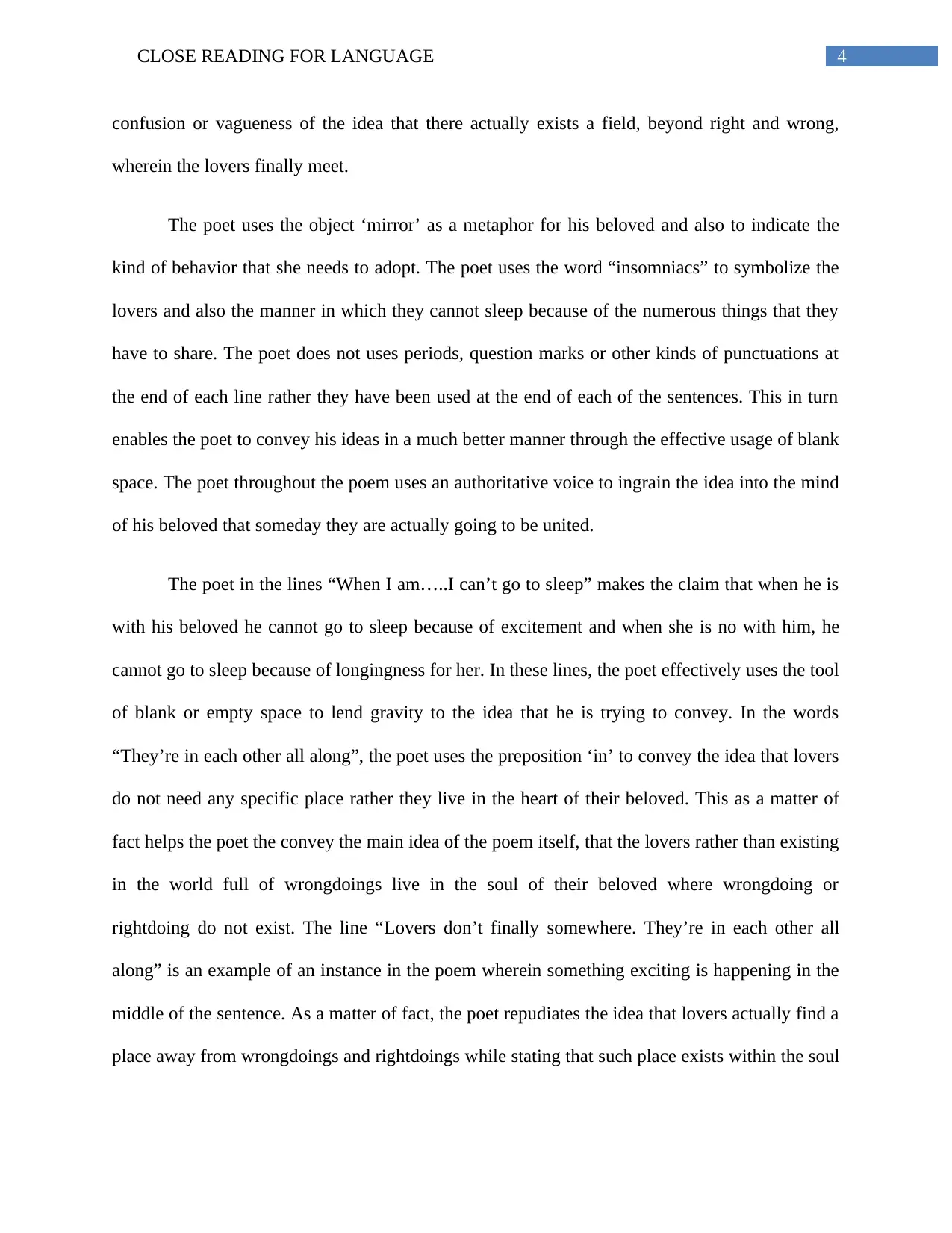
4CLOSE READING FOR LANGUAGE
confusion or vagueness of the idea that there actually exists a field, beyond right and wrong,
wherein the lovers finally meet.
The poet uses the object ‘mirror’ as a metaphor for his beloved and also to indicate the
kind of behavior that she needs to adopt. The poet uses the word “insomniacs” to symbolize the
lovers and also the manner in which they cannot sleep because of the numerous things that they
have to share. The poet does not uses periods, question marks or other kinds of punctuations at
the end of each line rather they have been used at the end of each of the sentences. This in turn
enables the poet to convey his ideas in a much better manner through the effective usage of blank
space. The poet throughout the poem uses an authoritative voice to ingrain the idea into the mind
of his beloved that someday they are actually going to be united.
The poet in the lines “When I am…..I can’t go to sleep” makes the claim that when he is
with his beloved he cannot go to sleep because of excitement and when she is no with him, he
cannot go to sleep because of longingness for her. In these lines, the poet effectively uses the tool
of blank or empty space to lend gravity to the idea that he is trying to convey. In the words
“They’re in each other all along”, the poet uses the preposition ‘in’ to convey the idea that lovers
do not need any specific place rather they live in the heart of their beloved. This as a matter of
fact helps the poet the convey the main idea of the poem itself, that the lovers rather than existing
in the world full of wrongdoings live in the soul of their beloved where wrongdoing or
rightdoing do not exist. The line “Lovers don’t finally somewhere. They’re in each other all
along” is an example of an instance in the poem wherein something exciting is happening in the
middle of the sentence. As a matter of fact, the poet repudiates the idea that lovers actually find a
place away from wrongdoings and rightdoings while stating that such place exists within the soul
confusion or vagueness of the idea that there actually exists a field, beyond right and wrong,
wherein the lovers finally meet.
The poet uses the object ‘mirror’ as a metaphor for his beloved and also to indicate the
kind of behavior that she needs to adopt. The poet uses the word “insomniacs” to symbolize the
lovers and also the manner in which they cannot sleep because of the numerous things that they
have to share. The poet does not uses periods, question marks or other kinds of punctuations at
the end of each line rather they have been used at the end of each of the sentences. This in turn
enables the poet to convey his ideas in a much better manner through the effective usage of blank
space. The poet throughout the poem uses an authoritative voice to ingrain the idea into the mind
of his beloved that someday they are actually going to be united.
The poet in the lines “When I am…..I can’t go to sleep” makes the claim that when he is
with his beloved he cannot go to sleep because of excitement and when she is no with him, he
cannot go to sleep because of longingness for her. In these lines, the poet effectively uses the tool
of blank or empty space to lend gravity to the idea that he is trying to convey. In the words
“They’re in each other all along”, the poet uses the preposition ‘in’ to convey the idea that lovers
do not need any specific place rather they live in the heart of their beloved. This as a matter of
fact helps the poet the convey the main idea of the poem itself, that the lovers rather than existing
in the world full of wrongdoings live in the soul of their beloved where wrongdoing or
rightdoing do not exist. The line “Lovers don’t finally somewhere. They’re in each other all
along” is an example of an instance in the poem wherein something exciting is happening in the
middle of the sentence. As a matter of fact, the poet repudiates the idea that lovers actually find a
place away from wrongdoings and rightdoings while stating that such place exists within the soul
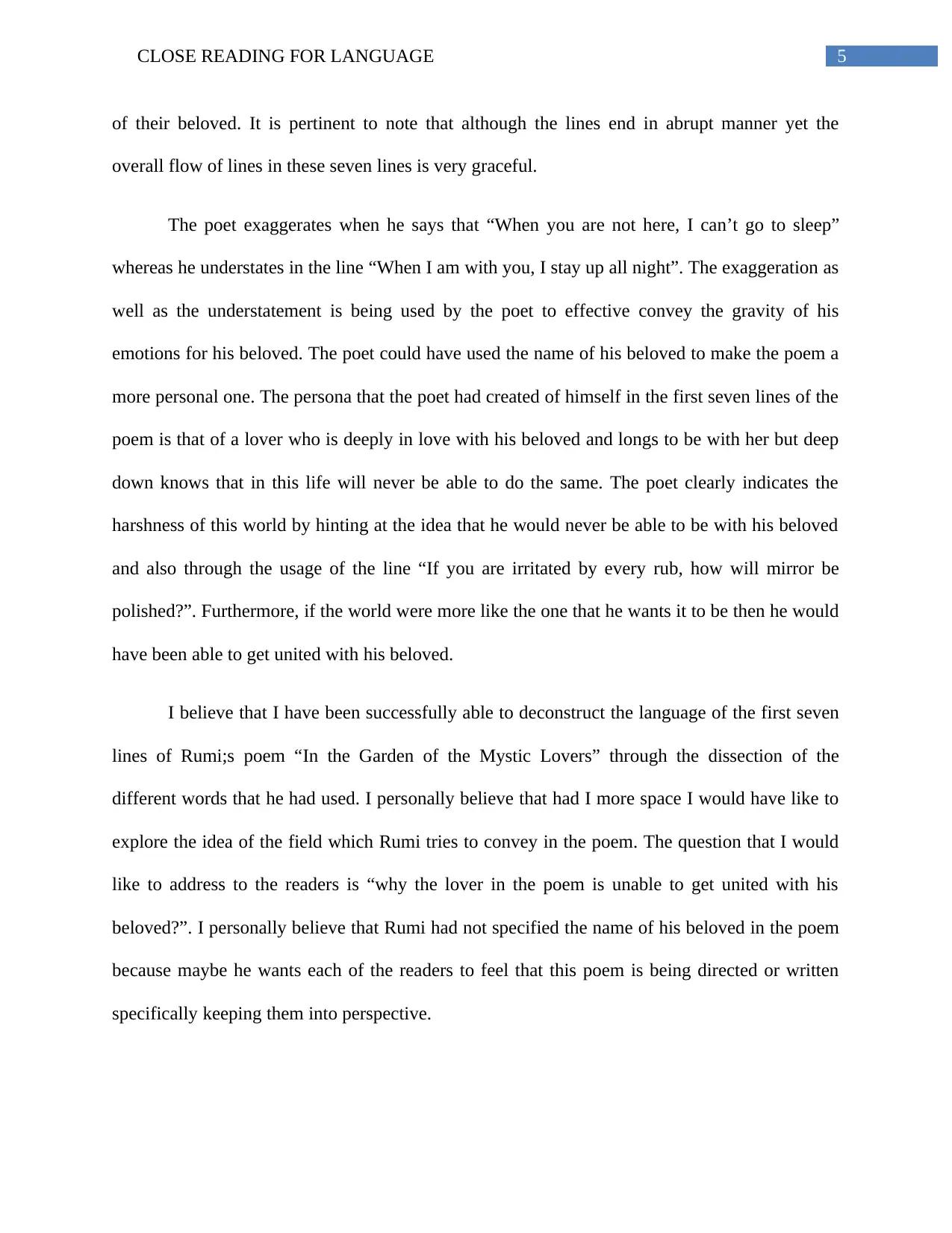
5CLOSE READING FOR LANGUAGE
of their beloved. It is pertinent to note that although the lines end in abrupt manner yet the
overall flow of lines in these seven lines is very graceful.
The poet exaggerates when he says that “When you are not here, I can’t go to sleep”
whereas he understates in the line “When I am with you, I stay up all night”. The exaggeration as
well as the understatement is being used by the poet to effective convey the gravity of his
emotions for his beloved. The poet could have used the name of his beloved to make the poem a
more personal one. The persona that the poet had created of himself in the first seven lines of the
poem is that of a lover who is deeply in love with his beloved and longs to be with her but deep
down knows that in this life will never be able to do the same. The poet clearly indicates the
harshness of this world by hinting at the idea that he would never be able to be with his beloved
and also through the usage of the line “If you are irritated by every rub, how will mirror be
polished?”. Furthermore, if the world were more like the one that he wants it to be then he would
have been able to get united with his beloved.
I believe that I have been successfully able to deconstruct the language of the first seven
lines of Rumi;s poem “In the Garden of the Mystic Lovers” through the dissection of the
different words that he had used. I personally believe that had I more space I would have like to
explore the idea of the field which Rumi tries to convey in the poem. The question that I would
like to address to the readers is “why the lover in the poem is unable to get united with his
beloved?”. I personally believe that Rumi had not specified the name of his beloved in the poem
because maybe he wants each of the readers to feel that this poem is being directed or written
specifically keeping them into perspective.
of their beloved. It is pertinent to note that although the lines end in abrupt manner yet the
overall flow of lines in these seven lines is very graceful.
The poet exaggerates when he says that “When you are not here, I can’t go to sleep”
whereas he understates in the line “When I am with you, I stay up all night”. The exaggeration as
well as the understatement is being used by the poet to effective convey the gravity of his
emotions for his beloved. The poet could have used the name of his beloved to make the poem a
more personal one. The persona that the poet had created of himself in the first seven lines of the
poem is that of a lover who is deeply in love with his beloved and longs to be with her but deep
down knows that in this life will never be able to do the same. The poet clearly indicates the
harshness of this world by hinting at the idea that he would never be able to be with his beloved
and also through the usage of the line “If you are irritated by every rub, how will mirror be
polished?”. Furthermore, if the world were more like the one that he wants it to be then he would
have been able to get united with his beloved.
I believe that I have been successfully able to deconstruct the language of the first seven
lines of Rumi;s poem “In the Garden of the Mystic Lovers” through the dissection of the
different words that he had used. I personally believe that had I more space I would have like to
explore the idea of the field which Rumi tries to convey in the poem. The question that I would
like to address to the readers is “why the lover in the poem is unable to get united with his
beloved?”. I personally believe that Rumi had not specified the name of his beloved in the poem
because maybe he wants each of the readers to feel that this poem is being directed or written
specifically keeping them into perspective.
⊘ This is a preview!⊘
Do you want full access?
Subscribe today to unlock all pages.

Trusted by 1+ million students worldwide

6CLOSE READING FOR LANGUAGE
Reference
Mojaddedi, Jawid. "Following the Scent of Rumi's Sufism in a Postreligious Age." World
Literature Today 91.6 (2017): 56-59.
Reference
Mojaddedi, Jawid. "Following the Scent of Rumi's Sufism in a Postreligious Age." World
Literature Today 91.6 (2017): 56-59.
1 out of 7
Your All-in-One AI-Powered Toolkit for Academic Success.
+13062052269
info@desklib.com
Available 24*7 on WhatsApp / Email
![[object Object]](/_next/static/media/star-bottom.7253800d.svg)
Unlock your academic potential
Copyright © 2020–2026 A2Z Services. All Rights Reserved. Developed and managed by ZUCOL.